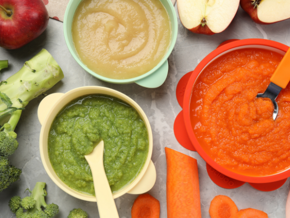
Weaning From The Breast
There may be many reasons why you will slowly reduce then stop breastfeeding, the right time will always depend on you and your baby. Whether it’s because baby is getting bigger and solids are introduced or your baby and you simply decide it’s the right time, there are some ways you can do it to minimise the problems that may arise for you or your baby.
Gradual weaning is best for both mother and baby. If weaning occurs before 12 months a suitable breast milk substitute would need to be introduced.
Replacing one feed at a time with defrosted expressed breast milk, age-appropriate infant formula, or full cream cow’s milk (if over 12 months of age and tolerated) will help reduce the likelihood of breast engorgement.
This can be a very emotional time for both mum and baby, as breastfeeding is a very special experience you share together. So ensure you have plenty of cuddles during the weaning process especially around feed times.
To start weaning, drop the feed in which your baby is the least interested in. For example, start by dropping a mid-morning or afternoon-tea feed, then progress to main meal feeds (ie. Breakfast, lunch or dinner). It is common to leave the feed just before going to bed in the evening as the last feed to drop – I’m sure you are very aware by now how important maintaining your night time routine is to sleep patterns.
You may notice your breasts feel a little extra full between feeds for the first few days when you drop a feed. This is normal and as you may be aware, the production of your breast milk works on supply and demand, so this will settle down with time. Allow your body to adjust to the reduced frequency of feeds before considering dropping another feed. This might be a week or so between each feed you decide to drop.
If your breasts become engorged, or you notice a hard sore lump on your breast –you may have a blocked duct. There are many ways you can help alleviate this blockage and it is important to act immediately before something more sinister develops, such as mastitis.
IMPORTANT NOTICE: Breast milk is best for babies and provides ideal nutrition. Good maternal nutrition is important for the preparation and maintenance of breastfeeding. Introducing partial bottle feeding could negatively affect breastfeeding and reversing a decision not to breastfeed is difficult. Professional advice should be followed on infant feeding. Infant formula should be prepared and used exactly as directed or it could pose a health hazard. The preparation requirements and cost of providing infant formula until 12 months of age should be considered before making a decision to formula feed.



















